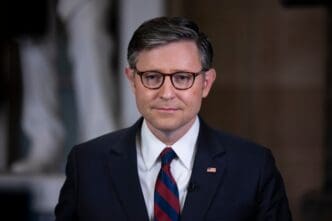Executive Summary
The Story So Far
Why This Matters
Who Thinks What?
House Speaker Mike Johnson confirmed Tuesday that he has discussed with President Donald Trump the constitutional limitations preventing a third presidential term, emphasizing that there is no viable path for such a scenario. Johnson characterized Trump’s public musings about a 2028 bid as an effort to “troll” Democrats, despite the constitutional barrier of the 22nd Amendment.
Constitutional Constraints
Johnson, who is a constitutional lawyer, directly referenced the 22nd Amendment, which limits a president to two terms. He stated that any amendment to the Constitution would be a lengthy and arduous process, requiring approximately ten years for ratification by two-thirds of the House and three-fourths of the states.
“I don’t see a way to amend the Constitution… to allow all the states to ratify,” Johnson told reporters on Capitol Hill. He noted that he and Trump have discussed “the constrictions of the Constitution,” acknowledging the widespread sentiment among many Americans who might wish otherwise.
Trump’s Public Statements and Intentions
President Trump has publicly entertained the idea of running for a third term, telling reporters he would “love to do it.” He has also floated potential 2028 pairings, such as Vice President JD Vance and Secretary of State Marco Rubio, though he ruled out running as vice president to later ascend to the White House, calling it “too cute.”
Johnson suggested that Trump enjoys using the topic to provoke his political opponents. “The Trump 2028 cap is one of the most popular that’s ever been produced. And he has a good time with that, trolling the Democrats, whose hair is on fire about the very prospect,” Johnson commented.
Allies Dismiss Third-Term Plans
Despite Trump’s public flirtations with a third term, sources close to the president indicate that the idea is not being seriously considered within his administration. These allies view the discussions as “catnip” for the media and Democrats, generating the kind of attention Trump appreciates.
One source close to Trump stated that the president is not seriously thinking about a 2028 campaign. They added that Trump is aware of his age and deeply values his legacy, wishing to avoid being perceived like former President Joe Biden, whose age and health became a frequent topic during his presidency.
Former Trump adviser Steve Bannon had previously claimed there was a “plan” for Trump to seek a third term. However, some White House officials downplayed Bannon’s comments, noting his diminished proximity to Trump’s inner circle and suggesting the remarks were an attempt to draw attention to himself.
Political Strategy and Future Considerations
The person close to Trump further argued that the president avoids acknowledging his remaining time in office to prevent being labeled a “lame duck” president. They also asserted that discussions about potential successors like Vance and Rubio are not serious considerations for 2028 at this time, but are expected to play a larger role closer to the midterms.
The ongoing discussions around a potential third term for Trump appear to serve multiple purposes: for Trump, it generates political buzz and engages his base; for Johnson, it offers an opportunity to clarify constitutional realities; and for opponents, it fuels speculation about Trump’s intentions, even as his close allies dismiss the prospect as a political tactic rather than a serious plan.








